Dehydration is the condition in which the body loses more water (whether through sweating, urinating, or breathing) than it takes in. The fluid needs to be replaced, or the body may get way too dehydrated.

About 60% of an adult’s body is made of water, which may explain why water is crucial to every organ’s proper functioning. Water protects the tissues and joints, keeps the body’s temperature normal, and helps it get rid of wastes. When it needs more water, your body lets you know in several ways if you are way too dehydrated.
1. Dry Mouth
 What is Dry Mouth? It is when the salivary glands don’t make enough saliva. Saliva helps prevent tooth decay, limits bacterial growth, improves digestion, and cleans the mouth. Dry mouth can also be a common side effect of certain medications. However, it is most commonly one of the first signs of dehydration.
What is Dry Mouth? It is when the salivary glands don’t make enough saliva. Saliva helps prevent tooth decay, limits bacterial growth, improves digestion, and cleans the mouth. Dry mouth can also be a common side effect of certain medications. However, it is most commonly one of the first signs of dehydration.
Saliva plays a crucial role in oral health and digestion. It contains enzymes that help break down food, and it helps to maintain the pH balance in the mouth, which is important for preventing tooth decay. Additionally, saliva helps to keep the mucous membranes in the mouth moist, aiding in comfort and preventing dryness.
When you’re dehydrated, the body prioritizes essential functions, and salivary glands may receive less stimulation to produce saliva. As a result, the mouth can become dry, and you may experience symptoms such as:
- Sticky or Thick Saliva: Dehydration can lead to changes in the consistency of saliva, making it thicker and more viscous.
- Dry or Sticky Feeling in the Mouth and Throat: A reduced flow of saliva can result in a dry, uncomfortable sensation in the mouth and throat.
- Bad Breath: Saliva helps cleanse the mouth by washing away bacteria. Reduced saliva production can contribute to bad breath, as bacteria may proliferate in a drier environment.
2. Disrupted Sleep
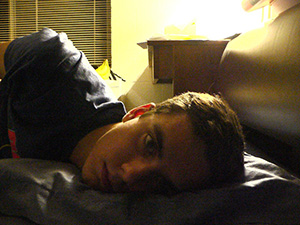 Not sleeping well is another sign that you are way too dehydrated. If you wake up in the middle of the night with no apparent reason, you may need to drink some water. Even mild dehydration dries out the mouth and nasal passages. This can lead to snoring and hoarseness in the morning, according to the National Sleep Foundation. It’s common to lose fluid during sleep by simply breathing, especially if you breathe through the mouth.
Not sleeping well is another sign that you are way too dehydrated. If you wake up in the middle of the night with no apparent reason, you may need to drink some water. Even mild dehydration dries out the mouth and nasal passages. This can lead to snoring and hoarseness in the morning, according to the National Sleep Foundation. It’s common to lose fluid during sleep by simply breathing, especially if you breathe through the mouth.
Another result of dehydration is experiencing muscle cramps or restless legs. Inadequate hydration can lead to imbalances in electrolytes, affecting sleep quality. Consistent water intake throughout the day is essential for promoting restful sleep and overall well-being.
3. Dark Yellow Urine
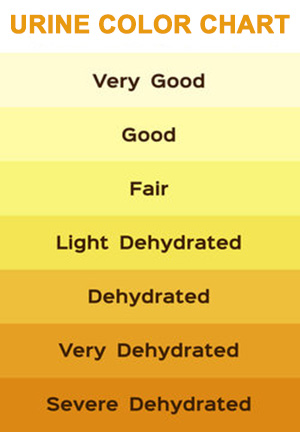 Dehydration can cause dizziness due to a reduction in blood volume and a decrease in blood pressure. When you’re dehydrated, your body loses fluids, including blood plasma. As a result, there is less blood circulating in your body, leading to a drop in blood pressure.
Dehydration can cause dizziness due to a reduction in blood volume and a decrease in blood pressure. When you’re dehydrated, your body loses fluids, including blood plasma. As a result, there is less blood circulating in your body, leading to a drop in blood pressure.
Lower blood pressure can affect the flow of blood to the brain, which may result in dizziness, light-headedness, and a feeling of unsteadiness. Staying adequately hydrated is crucial for maintaining blood volume and supporting overall cardiovascular health.
However, being way too hydrated isn’t always the reason behind dizziness. Dizziness can be brought on by multiple reasons. Inner ear disorders or even low blood sugar can also be the cause. If you feel you drink enough fluids, consult with your doctor.
4. Dizziness
 Dehydration can cause dizziness due to a reduction in blood volume and a decrease in blood pressure. When you’re dehydrated, your body loses fluids, including blood plasma. As a result, there is less blood circulating in your body, leading to a drop in blood pressure.
Dehydration can cause dizziness due to a reduction in blood volume and a decrease in blood pressure. When you’re dehydrated, your body loses fluids, including blood plasma. As a result, there is less blood circulating in your body, leading to a drop in blood pressure.
Lower blood pressure can affect the flow of blood to the brain, which may result in dizziness, light-headedness, and a feeling of unsteadiness. Staying adequately hydrated is crucial for maintaining blood volume and supporting overall cardiovascular health.
However, being way too hydrated isn’t always the reason behind dizziness. Dizziness can be brought on by multiple reasons. Inner ear disorders or even low blood sugar can also be the cause. If you feel you drink enough fluids, consult with your doctor.
5. Headache
 Mild or severe headaches, and even migraines, can be triggered by not enough water because then the body doesn’t have enough electrolytes to function properly. Scientists are not 100% sure why being way too dehydrated can cause headaches. However, here are the 3 main reasons that are given by the experts:
Mild or severe headaches, and even migraines, can be triggered by not enough water because then the body doesn’t have enough electrolytes to function properly. Scientists are not 100% sure why being way too dehydrated can cause headaches. However, here are the 3 main reasons that are given by the experts:
- Reduced Blood Volume: Dehydration results in a decrease in blood volume. This, in turn, reduces the flow of oxygen and nutrients to the brain, leading to a headache.
- Constriction of Blood Vessels: In response to dehydration, the body may try to conserve water by narrowing blood vessels. This constriction can affect blood flow to the brain, contributing to headache symptoms.
- Electrolyte Imbalance: Dehydration often involves the loss of essential electrolytes like sodium and potassium. Electrolytes play a crucial role in maintaining proper fluid balance and nerve function. Their imbalance can trigger headaches and other symptoms.
To prevent dehydration-related headaches, it’s important to stay well-hydrated by drinking an adequate amount of water throughout the day.
6. Rapid Heart Rate
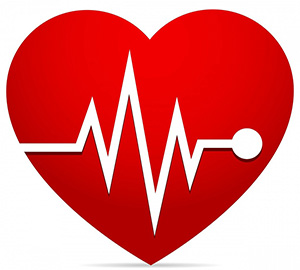 An increase in heart rate is another sign you might be way too dehydrated. This can be caused by the body not having as much blood circulating. Blood volume is lower, and the heart beats faster to compensate, causing an increase in heart rate. This is why you may feel palpitations.
An increase in heart rate is another sign you might be way too dehydrated. This can be caused by the body not having as much blood circulating. Blood volume is lower, and the heart beats faster to compensate, causing an increase in heart rate. This is why you may feel palpitations.
Dehydration can lead to a rapid heart rate (tachycardia) due to several physiological responses aimed at compensating for reduced blood volume and maintaining blood pressure. When you are dehydrated:
- Decreased Blood Volume: Dehydration results in a reduction of blood volume circulating in the body. To compensate for this, the heart may pump faster to maintain an adequate flow of blood to vital organs.
- Reduced Stroke Volume: Stroke volume refers to the amount of blood ejected by the heart with each beat. Dehydration can lead to a decrease in stroke volume, prompting the heart to beat more frequently to maintain cardiac output.
- Constriction of Blood Vessels: In an attempt to conserve water, the body may constrict blood vessels. This constriction can contribute to an increased heart rate as the heart works harder to push blood through narrower vessels.
- Electrolyte Imbalance: Dehydration often involves the loss of essential electrolytes, such as sodium and potassium, which play a crucial role in maintaining the balance of fluids and regulating heart function. An electrolyte imbalance can contribute to an increased heart rate.
It’s important to note that while mild dehydration may cause a temporary increase in heart rate, severe dehydration can lead to more serious complications, including fainting, heat-related illnesses, and cardiovascular issues. If you experience persistent symptoms of dehydration or rapid heart rate, it’s advisable to seek medical attention for proper evaluation and treatment.
7. Unusual Fatigue
 If you sleep well but still always feeling tired, the reason could be as simple as not enough water. The rule of thumb is to have at least two glasses of water every hour. What’s making you feeling tired may be the fact that your heart is working harder to pump blood to compensate for the loss of volume of blood due to dehydration.
If you sleep well but still always feeling tired, the reason could be as simple as not enough water. The rule of thumb is to have at least two glasses of water every hour. What’s making you feeling tired may be the fact that your heart is working harder to pump blood to compensate for the loss of volume of blood due to dehydration.
Being way too dehydrated can reduce blood volume and electrolyte imbalance, which we have gone over from above. Here a re 3 other functions that can be affected by dehydration:
Dehydration can cause unusual fatigue due to a combination of factors that impact the body’s ability to function optimally:
- Impaired Nutrient Transport: Dehydration affects the transport of nutrients, including glucose, to cells. Glucose is a primary source of energy for the body, and when its delivery to cells is compromised, it can lead to decreased energy levels and fatigue.
- Impaired Thermoregulation: Dehydration hampers the body’s ability to regulate temperature through sweating. Inadequate cooling can result in overheating, leading to increased fatigue and a sense of exhaustion.
- Cellular Function Disruption: Dehydration can disrupt cellular functions, affecting various physiological processes. This disruption can contribute to a general feeling of weakness and fatigue.
To prevent dehydration-related fatigue, it’s important to maintain proper hydration by drinking an adequate amount of water throughout the day. It’s especially crucial during physical activity, in hot weather, or when experiencing illness. If fatigue persists or is severe, it’s advisable to seek medical attention to rule out underlying health issues.
8. Sunken Eyes or Cheeks
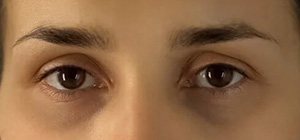 When the skin under the eyes looks dark, sunken, or hollow, you should probably increase your daily water intake. Dehydration is a very common cause for sunken eyes. Fluid retention under the eyes may lead to the extra “baggage” and for the skin to become more transparent, letting blood vessels and dark tissue underneath show.
When the skin under the eyes looks dark, sunken, or hollow, you should probably increase your daily water intake. Dehydration is a very common cause for sunken eyes. Fluid retention under the eyes may lead to the extra “baggage” and for the skin to become more transparent, letting blood vessels and dark tissue underneath show.
Dehydration can lead to a reduction in skin elasticity, causing the skin to appear sunken and less plump. When the body lacks adequate hydration, the skin may lose its turgor, leading to a sunken appearance, especially around the eyes and cheeks.
When the body is dehydrated, it may prioritize directing the available fluids to essential organs, leading to a redistribution of fluid away from the skin. This can result in the sunken appearance of the eye sockets and cheeks.
Dehydration can cause blood vessels to constrict, reducing blood flow to the skin. Diminished blood flow can lead to a darker appearance under the eyes, commonly referred to as dark circles or bags.
Dehydration may also contribute to changes in skin pigmentation, making the skin under the eyes appear darker. This can be more noticeable when the skin is dehydrated and lacks the natural hydration that contributes to a healthy complexion.
To address the cosmetic effects of dehydration, it’s important to maintain proper hydration by drinking enough water throughout the day. Adequate skincare, including moisturizing, can also help improve skin elasticity and reduce the appearance of sunken eyes and dark circles. However, it’s important to note that other factors, such as genetics, aging, and lack of sleep, can also contribute to these cosmetic concerns, and addressing dehydration is just one aspect of maintaining overall skin health.
9. Confusion
 Dehydration can cause confusion due to its impact on various physiological functions, including those within the brain. Here are some reasons why dehydration may lead to confusion:
Dehydration can cause confusion due to its impact on various physiological functions, including those within the brain. Here are some reasons why dehydration may lead to confusion:
- Reduced Blood Volume: Dehydration results in a decrease in blood volume circulating through the body, including the brain. This reduction in blood volume can compromise the delivery of oxygen and nutrients to the brain, affecting cognitive function and leading to confusion.
- Electrolyte Imbalance: Dehydration often involves the loss of essential electrolytes, such as sodium and potassium. Electrolytes play a crucial role in nerve signaling and the transmission of electrical impulses in the brain. An imbalance can disrupt normal brain function and contribute to confusion.
- Impaired Cognitive Performance: Dehydration has been linked to impaired cognitive performance, including difficulties with concentration, memory, and decision-making. These cognitive functions are essential for maintaining mental clarity, and their impairment can contribute to confusion.
- Altered Hormonal Regulation: Dehydration can affect the secretion of certain hormones, including antidiuretic hormone (ADH). Changes in hormonal regulation can impact fluid balance and contribute to cognitive dysfunction.
- Increased Stress on the Body: Dehydration places stress on the cardiovascular system as the heart works harder to pump blood with reduced fluid volume. This increased stress can affect overall circulation, including blood flow to the brain, potentially leading to confusion.
It’s important to note that the severity of confusion due to dehydration can vary, and in extreme cases, it may be associated with more serious conditions, such as heat-related illnesses. If someone is experiencing confusion along with other symptoms of dehydration, it’s crucial to seek medical attention promptly for proper evaluation and treatment. Maintaining adequate hydration is key to supporting overall cognitive function and preventing dehydration-related confusion.
10. Muscle Cramps
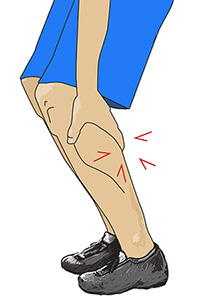 Most muscle cramps develop in the calves, and they are painful. The sudden and sharp pain you feel may have been prevented if you drank more water. Water helps muscles contract and relax. Lack of it puts a strain on them. When the blood flow to the muscle is reduced it can cause cramp-like pain.
Most muscle cramps develop in the calves, and they are painful. The sudden and sharp pain you feel may have been prevented if you drank more water. Water helps muscles contract and relax. Lack of it puts a strain on them. When the blood flow to the muscle is reduced it can cause cramp-like pain.
Being way too dehydrated can cause electrolyte imbalance as mentioned. Here are 3 other reasons why dehydration can cause muscle cramps:
- Reduced Blood Flow to Muscles: Dehydration can lead to a decrease in blood volume and thicker blood consistency. This reduction in blood flow to muscles may limit the delivery of oxygen and nutrients, causing muscles to spasm and cramp.
- Impaired Heat Dissipation: Dehydration can compromise the body’s ability to regulate temperature through sweating. When the body overheats, as can happen in dehydration, the risk of muscle cramps increases. Sweating helps cool the body, and dehydration can reduce the effectiveness of this cooling mechanism.
- Increased Lactic Acid Accumulation: Dehydration may contribute to an accumulation of lactic acid in the muscles. Lactic acid buildup can lead to muscle fatigue and cramping.
To prevent muscle cramps associated with dehydration, it’s important to maintain proper hydration by drinking enough water throughout the day. In cases of prolonged or severe dehydration, especially during intense physical activity or in hot environments, electrolyte-rich beverages or supplements may be recommended to restore the balance of electrolytes.
11. Sugar Cravings
 Craving something sweet may be a sign your body needs more water. Dehydration may cause problems for all organs, including the liver, which stores and releases glycogen, or glucose, the sugar your body uses for energy. The body may then crave something sweet for a quick energy boost.
Craving something sweet may be a sign your body needs more water. Dehydration may cause problems for all organs, including the liver, which stores and releases glycogen, or glucose, the sugar your body uses for energy. The body may then crave something sweet for a quick energy boost.
Dehydration can contribute to sugar cravings through several mechanisms:
- Energy Depletion: When the body is dehydrated, there may be a perceived lack of energy. This can trigger cravings for sugary foods as a quick source of energy, as simple sugars are rapidly metabolized and can provide a temporary energy boost.
- Impaired Glycogen Production: Dehydration can affect the body’s ability to produce glycogen, which is a stored form of glucose used for energy. As a result, the body may signal a need for quick energy, leading to cravings for sugary foods.
- Changes in Hormones: Dehydration can influence hormonal regulation, including hormones related to hunger and satiety. Ghrelin, a hormone that stimulates appetite, may increase in response to dehydration, potentially leading to cravings for high-calorie, sugary foods.
- Mood Changes: Dehydration can impact mood and cognitive function. Individuals may experience irritability, fatigue, or stress when dehydrated, and these emotional states can trigger cravings for comfort foods, which often include sugary treats.
It’s important to note that while dehydration can contribute to sugar cravings, other factors such as dietary habits, stress, and hormonal fluctuations can also influence cravings. Addressing dehydration by staying well-hydrated with water and consuming a balanced diet can help manage sugar cravings and support overall health. If cravings persist or are a concern, it’s advisable to consult with a healthcare professional or a registered dietitian for personalized guidance.
Conclusion to Being Way Too Dehydrated
For many of us, it isn’t always easy to remember to drink water throughout the day. We all get busy and before you know it, the day is half gone. Even sitting at a desk all day, it is important to drink plenty of water. Doctors recommend for people to drink 64 ounces of water per day. Of course, some people can drink double that, while others might make half of that.
The important thing is to drink as much water as you can. Drinking sodas all day is not healthy. Caffeinated sodas are a diuretic, and even though sodas technically cause increased urination and fluid loss. Sodas will not fully dehydrate you. The point is, decrease the soda drinks and increase your water intake.
Try to make a habit and routine throughout the day for drinking water. Set reminders on your phone, watch or computer. If you’re not a big fan of water, infuse it with flavorings. Keep a watch for all the symptoms from above, especially your urine color.
You will also find, trying to keep a healthy diet will naturally incorporate a higher water intake. So, try to exercise and eat right. Keep hydrated with water, especially before, during and after exercising. You can learn more about a better diet by reading; Eat More To Lose Weight.


I have been surfing online more than 3 hours today yet I never found any interesting article like yours It is pretty worth enough for me In my opinion if all web owners and bloggers made good content as you did the web will be much more useful than ever before
I truly appreciate your technique of writing a blog. I added it to my bookmark site list and will